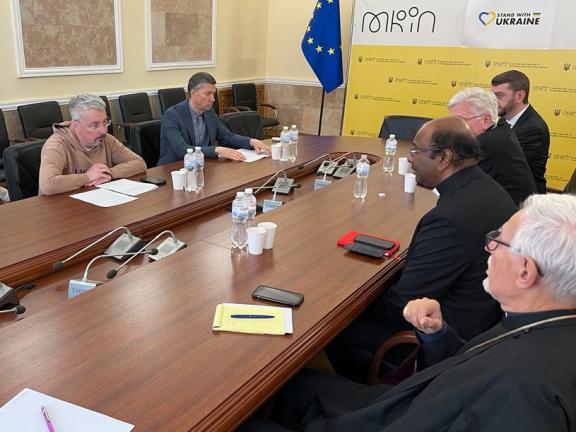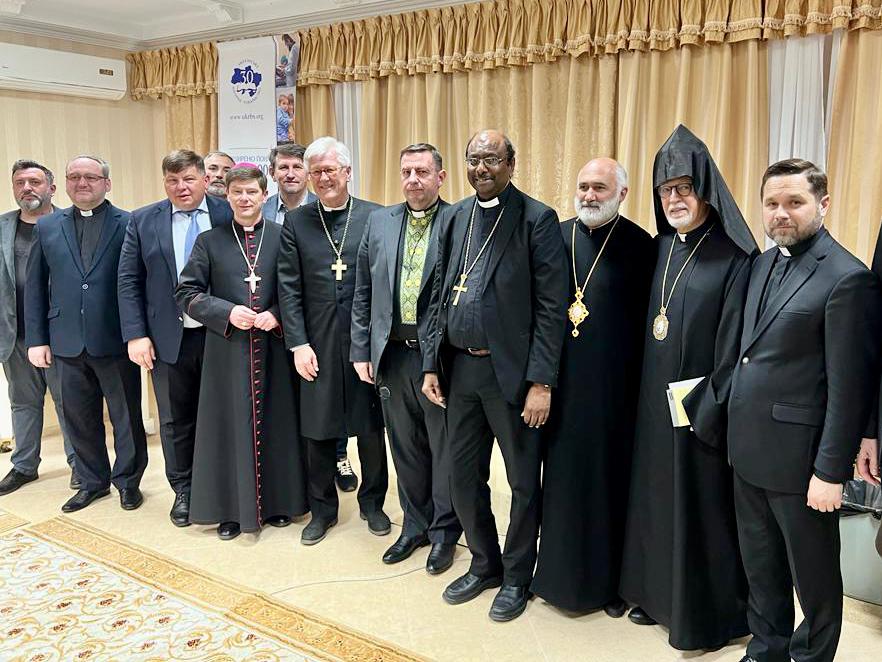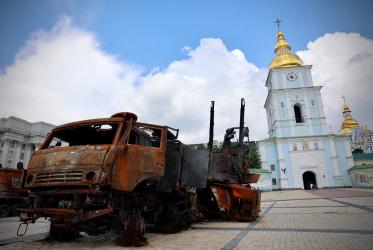The WCC delegation consists of Bishop Dr Heinrich Bedford-Strohm, WCC moderator of the central committee; H.E. Archbishop Dr Vicken Aykazian, vice-moderator of the WCC central committee; and Rev. Prof. Dr Jerry Pillay, WCC general secretary. The delegation is accompanied by Peter Prove, WCC director of the Commission of the Churches on International Affairs and Prof. Dr Vasile-Octavian Mihoc, WCC programme executive for Ecumenical Relations and Faith and Order.
The WCC delegation met with senior leaders of both the Ukrainian Orthodox Church (UOC) and the Orthodox Church of Ukraine (OCU), two churches whose longstanding dispute has intensified since the Russian invasion. The UOC has declared its independence from the Moscow Patriarchate to which it was formerly affiliated, while the OCU – granted autocephaly by the Ecumenical Patriarchate of Constantinople – has applied for WCC membership. The visiting delegation confirmed the WCC’s readiness to host discussions among the two churches for the resolution of the issues between them.
Both Metropolitan Anthony, Chancellor of the UOC, and Metropolitan Epifaniy, Primate of the OCU, have given clear signs of their willingness to engage in dialogue. This openness to dialogue offers a sign of hope of healing one of the many wounds and divisions which this tragic conflict has deepened.
Churches are called to play a role in the healing of these wounds, in ending this illegal and immoral war, and in promoting a just peace for the people of Ukraine, of the region and of the world. This message was also emphasized in meetings with members of the Ukrainian Council of Churches and Religious Organizations (UCCRO), and with Ukrainian Minister of Culture and Information Policy Mr Oleksandr Tkachenko.
The WCC delegation’s programme included a visit to the Kyiv Pechersk Lavra, one of the holiest sites of Orthodox Christianity in the region and beyond, which has become a flashpoint for tensions between the UOC and the OCU, and for concerns regarding religious freedom and rights in the context of government measures to remove the UOC’s institutions and monastic community from the Lavra. On leaving the Lavra, the WCC delegates were invited to greet people praying at the entrance to the monastery.
Especially during this time of war, with Ukraine confronting the invasion of its territory by Russian forces, the Ukrainian people need unity, not division. Harmony among the religious communities of Ukraine is an essential element for the national unity that this crisis demands. The WCC looks forward to working with the churches and with the government of Ukraine to foster this unity, and to reduce divisions and disunity among the faithful.
In this regard, WCC general secretary Pillay expressed his gratitude and appreciation for the in principle agreement indicated by the UOC and OCU representatives with whom the WCC delegation met to participate in roundtable dialogue meetings to be convened by the WCC. The WCC will now proceed with work towards an initial roundtable dialogue meeting later this year.
The WCC leadership delegation continued its pilgrimage in Ukraine with an ecumenical prayer service in Bucha, a community from which reports of appalling atrocities committed during the Russian occupation of the area have emerged.
WCC delegation visits Ukraine (WCC news release 10 May 2023)

WCC leaders also met the Ukrainian Minister of Culture and Public Information Oleksandr Tkachenko.






